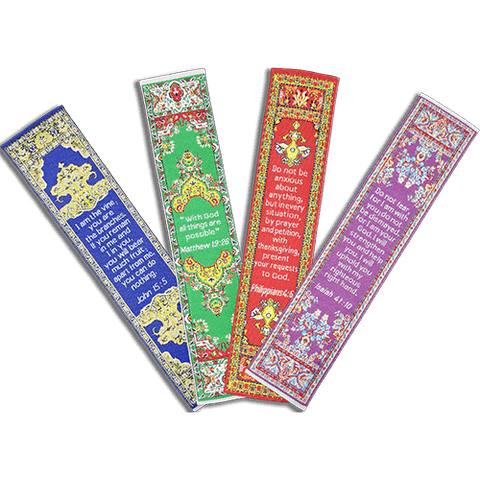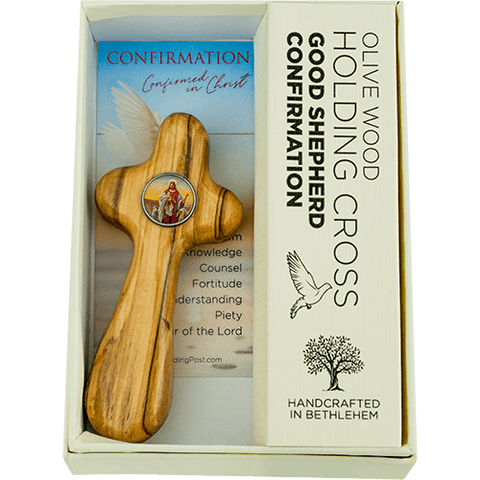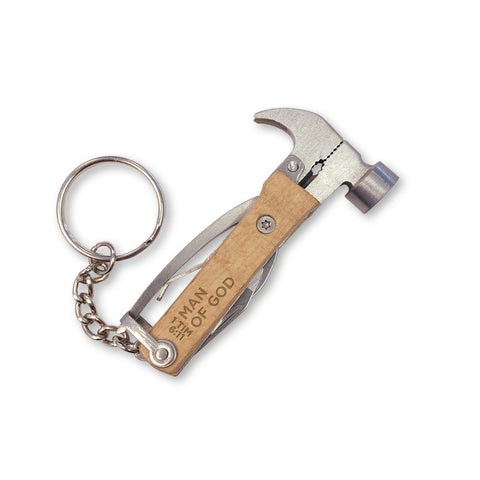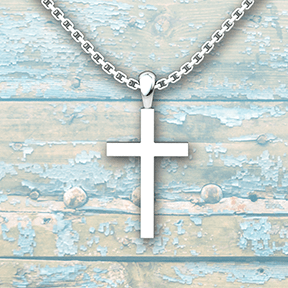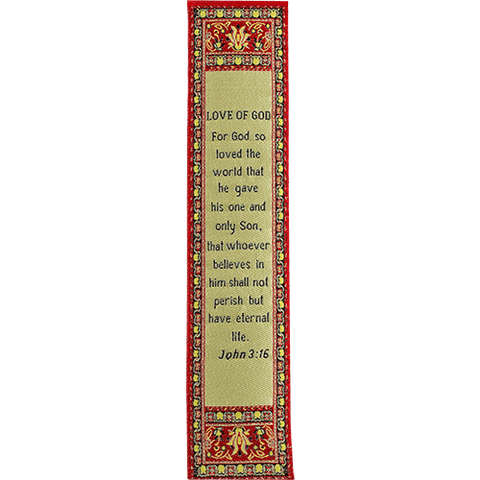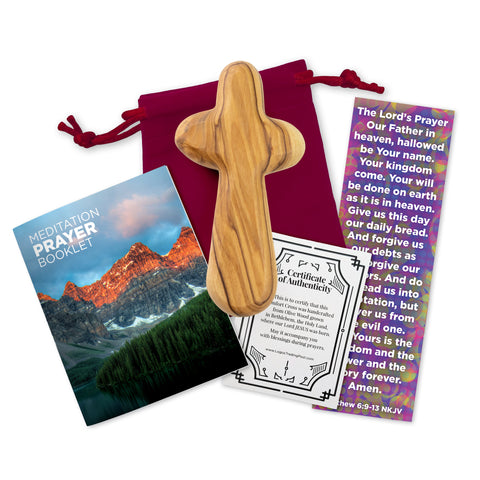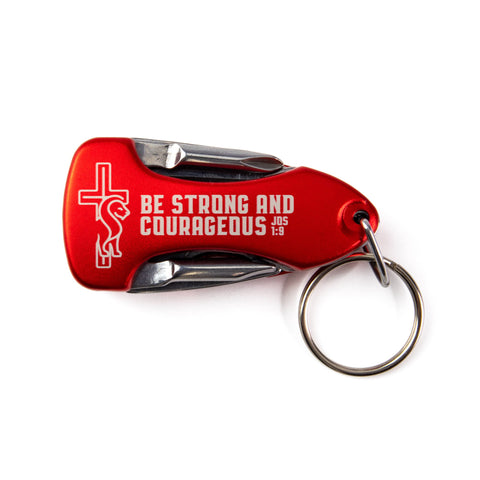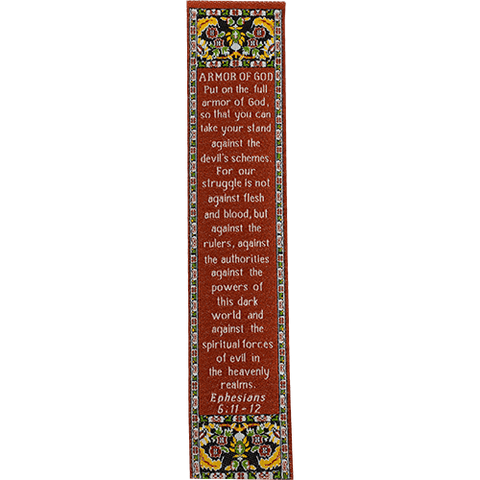- 3D Art Crystals (6)
- Acrylic Plaques (32)
- Air Fresheners- Christian and Catholic (4)
- All Christian Bookmarks (282)
- Armor of God Coin Collection (14)
- Auto Rosaries (30)
- Baptism Gifts Boys and Girls (69)
- Beauty Accessories (32)
- Birthstones (36)
- Boho Cross Bracelets (5)
- Bookmark Bible Cards (4)
- Bookmark Sets (28)
- Bookmarks (224)
- Bookmarks - Assurance (10)
- Bookmarks - Christian Life (15)
- Bookmarks - Confession (4)
- Bookmarks - God (3)
- Bookmarks - Mission (4)
- Bookmarks - Prayer (3)
- Bookmarks - Salvation (7)
- Bookmarks - Scripture (3)
- Bookmarks - Scripture Card (85)
- Bookmarks - Tasseled (71)
- Bookmarks - Tatted (7)
- Bulk - Wholesale - Olive Wood Ornaments and Nativities- Located in USA (103)
- Bulk Anointing Oils (19)
- Catholic - Icon Keyrings (12)
- Catholic Gifts (411)
- Catholic Jewelry (74)
- Catholic Medallions (2)
- Catholic Olive Wood Crosses (80)
- Catholic Olive Wood Stand Plaques (25)
- Catholic Pins (7)
- Catholic Tapestry Rosary Pouch (36)
- Children's Bookmark Assortments (6)
- Children's Christian Bookmarks (37)
- Children's Pass Along Card Assortments (6)
- Children's Pass Along Cards (47)
- Children's Poster Prints (10)
- Christian Bookmark Assortments (45)
- Christian Bookmark Bulk Packs (119)
- Christian Challenge Coins (139)
- Christian Rings for Men and Women (57)
- Christmas (178)
- Christmas Cards (7)
- Christmas Jewelry (0)
- Christmas Olive Wood (104)
- Christmas Ornaments (151)
- Coin Assortments (6)
- Comfort Crosses (42)
- Communion Cups (1)
- Confirmation & Christening Gifts (180)
- Cross Necklace Wood (40)
- Crosses - Olive Wood for Desk (10)
- Crosses - Olive Wood for Wall (23)
- Crucifixion Nail Replicas (2)
- Desk Accessories (3)
- Easter - Resurrection Products (21)
- Father's Day (36)
- Featured (161)
- First Communion Gifts (125)
- Flashlights (40)
- Floral Scripture Pens (6)
- Fridge Scripture Magnets (55)
- Gifts (12)
- Handyman Pens (14)
- Holiday Bookmarks (7)
- Holy Land Anointing Oil from Israel For Prayer (86)
- Holy Water Bottles (35)
- Hot Deals (15)
- Influencers Ministries Journey Products (6)
- Jerusalem Cross (23)
- John 3:16 Coins: God's Love Challenge Coin Collection (3)
- Keychains (8)
- Kitchen Conversion Chart (1)
- Lapel Pins (3)
- Leather (46)
- Leather Bookmarks (6)
- Leather Keychains (26)
- Leather Wall Crosses (6)
- Leather Wallets (8)
- Light Up Pens (12)
- Logos Woven Fabric, Mini Carpet, Christian, Bookmarks (80)
- Love Expression Coins (37)
- Lo•gos Jewelry (195)
- Magnetic Bookmarks (25)
- Medical Coins (2)
- Messianic Jewelry (13)
- Metallic Scripture Pens (6)
- Mother of Pearl Rosaries (30)
- Multi-Tools (48)
- Nail Clippers and Files (19)
- New Arrivals (59)
- Note Cards (2)
- Olive Wood - Comfort Angel (9)
- Olive Wood - Holy Land (522)
- Olive Wood Bracelets (26)
- Olive Wood Christmas Ornaments (86)
- Olive Wood Crosses (164)
- Olive Wood Finger Rosary (1)
- Olive Wood Icons (63)
- Olive Wood Keychains (44)
- Olive Wood Magnets (51)
- Olive Wood Memorial Crosses (4)
- Olive Wood Mezuzahs (8)
- Olive Wood Nativities (73)
- Olive Wood Nativity Sets (17)
- Olive Wood Necklaces (42)
- Olive Wood Pendant/Charm - Catholic (1)
- Olive Wood Plaques (21)
- Olive Wood Scripture Plaques (5)
- Paper Clips (6)
- Pass Along Cards - Joy (5)
- Pass Along Cards - Trust (5)
- Pass Along Cards - Don't Worry (5)
- Pass Along Cards - Faith (5)
- Pass Along Cards - Healing (5)
- Pass Along Cards - Hope (5)
- Pass Along Cards - Peace (5)
- Pass Along Cards - Praise (5)
- Pass Along Cards - Prayer (5)
- Pass Along Cards - Protection (5)
- Pass Along Cards - Purpose (6)
- Pass Along Cards - Stand Firm (5)
- Pass Along Scripture Card Assortments (20)
- Pass Along Scripture Cards (181)
- Patriotic (4)
- Pearl Scripture Pens (6)
- Pectoral Crosses (4)
- Pens (87)
- Pens - Deluxe Scripture Pens (15)
- Pens - Scripture Pen and Bookmark Sets (24)
- Poster Prints (23)
- Prayer Cards (1)
- Public Servant Christian Coins (13)
- Recipe Cards (6)
- Rosary, Olive Wood (42)
- Saint Benedict Crosses with Italian made Medal from the Holy Land (5)
- Salvation Cards (2)
- Sandalwood Beard Combs (12)
- School Coins (4)
- Scripture Art Prints (12)
- Scripture Bar Pendant (16)
- Scripture Cards to Pass them on (18)
- Scripture Magnets (50)
- Scripture Pen and Flashlight Sets (6)
- Seven Churches of Revelation (17)
- Soft Touch Barrel Cross Pens (9)
- Spanish Bookmarks (3)
- Sports Coins (19)
- Stainless Steel Jewelry (71)
- Stainless Steel Jewelry - Chains (7)
- Stainless Steel Jewelry - Leather Band Bracelets (15)
- Stainless Steel Jewelry - Men's Bracelets (9)
- Stainless Steel Jewelry - Necklaces (4)
- Stainless Steel Jewelry - Pendants (54)
- Stainless Steel Jewelry - Rings (2)
- Stainless Steel Jewelry - Women's Bracelets (17)
- Star of David (10)
- Statues (9)
- Sterling Silver Bracelets (4)
- Sterling Silver Chains (9)
- Sterling Silver Earrings (24)
- Sterling Silver for Him (9)
- Sterling Silver Gifts For Mom (8)
- Sterling Silver Necklaces (5)
- Sterling Silver Pendants - Christian Fine Jewelry (235)
- Sterling Silver Sets (10)
- Tape Measures (12)
- Thanksgiving - Products (5)
- Thin Scripture Pens (10)
- Tire Gauges (8)
- Trust in The Lord! (23)
- Wall Crosses - Catholic (13)
- Wallet Scripture Cards (40)
- Wallets (16)
- Wooden Icons (11)
- Words of Life Cross Necklaces (36)
HOT ITEMS
These olive wood mezuzahs are handcrafted in Bethlehem of the Biblical Holy Land, and we can assure you that they are of the highest quality. Our Holy Land olive wood is used to craft a variety of products to suit a variety of believers. As far as our mezuzahs are concerned, we have eight different kinds with distinct designs carved into them, each accompanied by a mezuzah scroll bearing Deuteronomy 6:4-9 written in Hebrew. It’s quite the variety!
Of course, one mezuzah for sale which we are especially proud of is our Messianic Symbol Olive Wood Mezuzah. Messianic Judaism has faith in Jesus Christ as the Messiah, but it remains steeped in the richness of Jewish tradition. It is our pleasure, then, to have this mezuzah for sale as well as a variety of Messianic symbol products.
Whatever you select, we are proud to carry only the finest of olive wood carvings. It is also worth mentioning that whichever of our many products you choose, you’re in for something entirely unique. Since you would be getting a hand-carved Holy Land olive wood cross, every single one has a unique wood grain due to olive wood’s natural variations.
Whether you’re interested in one of these products or if you’re interested in something else on our website, we are happy to be a blessing to you through our business!
For wholesale and bulk discounts and to apply for an account please visit Logos Trading Post wholesale website. Click here to go to our wholesale website.
There are no products in this collection.
LOGOS TRADING POST - HOLY LAND OLIVE WOOD MEZUZAHS
The Mezuzah: Traditional for Some & New for Others
Deuteronomy 6:4-9 says, “Hear, O Israel: The Lord is our God, the Lord alone. You shall love the Lord your God with all your heart, and with all your soul, and with all your might. Keep these words that I am commanding you today in your heart. Recite them to your children and talk about them when you are at home and when you are away, when you lie down and when you rise. Bind them as a sign on your hand, fix them as an emblem on your forehead, and write them on the doorposts of your house and on your gates.” These are the words of scripture that both serve as inspiration of the mezuzah placement and are written upon the scroll found within. Placing these words within our homes as a blessing to our lives and families is a meaningful act, one that you can be reminded of each and every time you look upon the mezuzah you have mounted on your doorpost.
For those outside of Judaism - or Christian faith heavily inspired by it such as Messianic Judaism - the mezuzah and the act of mezuzah placement may be quite unfamiliar. If that is the case for you, worry not! It is our hope in these few paragraphs that we may tell you just a bit more about what exactly the mezuzah is, what purpose it serves, and how one can go about placing one in the home. Keep an open mind, and perhaps at the end of this you might be interested in getting a mezuzah for yourself, in which case we are sure to have mezuzah for sale just for you!
The Mezuzah: Origins & Faith Traditions
Before going further, we should note that there are actually two scrolls that fill the mezuzah. The first is Deuteronomy 6:4-9, written above, containing the command to hang the mezuzah in the first place and the exhortation to keep all that God has commanded us. The second, however, contains a list of promises God gives to those who keep the commandments, promises of great blessing! These promises are written in Deuteronomy 11:13-21, which says, “And if you will indeed obey my commandments that I command you today, to love the Lord your God, and to serve him with all your heart and with all your soul, he will give the rain for your land in its season, the early rain and the later rain, that you may gather in your grain and your wine and your oil. And he will give grass in your fields for your livestock, and you shall eat and be full. Take care lest your heart be deceived, and you turn aside and serve other gods and worship them; then the anger of the Lord will be kindled against you, and he will shut up the heavens, so that there will be no rain, and the land will yield no fruit, and you will perish quickly off the good land that the Lord is giving you. You shall therefore lay up these words of mine in your heart and in your soul, and you shall bind them as a sign on your hand, and they shall be as frontlets between your eyes. You shall teach them to your children, talking of them when you are sitting in your house, and when you are walking by the way, and when you lie down, and when you rise. You shall write them on the doorposts of your house and on your gates, that your days and the days of your children may be multiplied in the land that the Lord swore to your fathers to give them, as long as the heavens are above the earth.” That’s quite a lot for one scroll, but isn’t it a wonderful blessing that God promises so very much to those that simply obey Him in faith? The idea behind this is that you would not only invite blessing upon your household, but that you would be consistently reminded at your doorpost of both the exhortation to follow God’s commands and the blessings that He is faithful to bestow upon you when you do so.
Really, the origin of the Mezuzah can be simplified to be just that: Jewish followers of YHWH wishing to obey His command to “write [My commands] on the doorposts of your house and on your gates” and wishing to remind themselves to keep all His commands. God’s Law, given through Moses, was and is one of the most important matters of Jewish faith, and even Christians would do good to not dismiss it. After all, the Christ of Christianity Himself even said in Matthew 5:17-19, “Do not think that I have come to abolish the Law or the Prophets; I have not come to abolish them but to fulfill them. For truly I say to you, until heaven and earth pass away, not an iota, not a dot, will pass from the Law until all is accomplished. Therefore whoever relaxes one of the least of these commandments and teaches others to do the same will be called least in the kingdom of heaven, but whoever does them and teaches them will be called great in the kingdom of heaven.” Christians must understand that, yes, righteousness has been bought through the sacrifice of Christ, but this does not mean to ignore what He says or what He has said millennia ago.
Still, let us not take this as a burden, remembering that His Law is a blessing. After all, the Psalmist writes in Psalm 119:97, “Oh how I love your law! It is my meditation all the day.” Whether a traditional Jew or a Christian born out of a modern movement, it does us all good to be reminded of the value of the Law. Maybe these words were reminder enough, but, of course, picking up any Holy Land Olive Wood mezuzah for sale would be a great, daily reminder as well of both the commandments of God and promises He has made to those who live by them.

